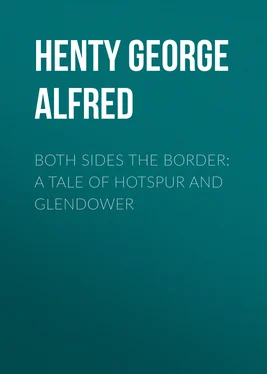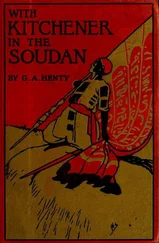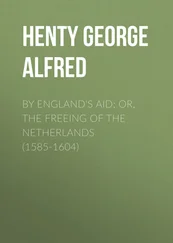George Henty - Both Sides the Border - A Tale of Hotspur and Glendower
Здесь есть возможность читать онлайн «George Henty - Both Sides the Border - A Tale of Hotspur and Glendower» — ознакомительный отрывок электронной книги совершенно бесплатно, а после прочтения отрывка купить полную версию. В некоторых случаях можно слушать аудио, скачать через торрент в формате fb2 и присутствует краткое содержание. Жанр: Альтернативная история, foreign_antique, foreign_prose, foreign_children, Исторические приключения, на английском языке. Описание произведения, (предисловие) а так же отзывы посетителей доступны на портале библиотеки ЛибКат.
- Название:Both Sides the Border: A Tale of Hotspur and Glendower
- Автор:
- Жанр:
- Год:неизвестен
- ISBN:нет данных
- Рейтинг книги:3 / 5. Голосов: 1
-
Избранное:Добавить в избранное
- Отзывы:
-
Ваша оценка:
- 60
- 1
- 2
- 3
- 4
- 5
Both Sides the Border: A Tale of Hotspur and Glendower: краткое содержание, описание и аннотация
Предлагаем к чтению аннотацию, описание, краткое содержание или предисловие (зависит от того, что написал сам автор книги «Both Sides the Border: A Tale of Hotspur and Glendower»). Если вы не нашли необходимую информацию о книге — напишите в комментариях, мы постараемся отыскать её.
Both Sides the Border: A Tale of Hotspur and Glendower — читать онлайн ознакомительный отрывок
Ниже представлен текст книги, разбитый по страницам. Система сохранения места последней прочитанной страницы, позволяет с удобством читать онлайн бесплатно книгу «Both Sides the Border: A Tale of Hotspur and Glendower», без необходимости каждый раз заново искать на чём Вы остановились. Поставьте закладку, и сможете в любой момент перейти на страницу, на которой закончили чтение.
Интервал:
Закладка:
"Now, my boy, you had best spend an hour in cleaning up your father's armour and arms. The steel cap must go to the armourer at Alwinton, for repair; but you can get some of the dints out of his breast and back pieces, and can give them a fresh coat of black paint;" for the borderers usually darkened their armour so that, in their raids, their presence should not be betrayed by the glint of sun or moon upon them.
Oswald at once took up the armour, and went down the steps into the courtyard, so that the sound of his hammer should not disturb the sleepers. As, with slight but often repeated blows, he got out the dents that had been made in the fray, he thought over what his mother had been saying. To him also the death of three of the men, who had for years been his companions, came as a shock. It was seldom, indeed, that the forays for cattle lifting had such serious consequences. As a rule they were altogether bloodless; and it was only because of the long feud with the Bairds, and the fact that some warning of the coming of the party had, in spite of their precaution, reached Allan Baird; that on the present occasion such serious results had ensued.
Had it not been for this, the cattle would have been driven off without resistance, for Allan Baird's own household would not have ventured to attack so strong a party. No attempt would have been made to assault his hold; for he had often heard his father say that, even in the case of a blood feud, he held that houses should not be attacked, and their occupants slain. If both parties met under arms the matter was different; but that, in spite of the slaying of his own father by them, he would not kill even a Baird on his hearthstone.
Still, a Baird had been killed, and assuredly William Baird would not be deterred by any similar scruples. His pitiless ferocity was notorious, and even his own countrymen cried out against some of his deeds, and the Earl of Douglas had several times threatened to hand him over to the English authorities; but the Bairds were powerful, and could, with their allies, place four or five hundred men in the field; and, in the difficult country in which they lived, could have given a great deal of trouble, even to Douglas. Therefore nothing had come of his threats, and the Bairds had continued to be the terror of that part of the English border that was the most convenient for their operations.
Oswald was now past sixteen, and promised to be as big a man as his father, who was a fine specimen of the hardy Northumbrian race–tall, strong, and sinewy. He had felt hurt when his father had refused to allow him to take part in the foray.
"Time enough, lad, time enough," he had said, when the lad had made his petition to do so. "You are not strong enough, yet, to hold your own against one of the Bairds' moss troopers, should it come to fighting. In another couple of years it will be time enough to think of your going on such an excursion as this. You are clever with your arms, I will freely admit; as you ought to be, seeing that you practise for two hours a day with the men. But strength counts as well as skill, and you want both when you ride against the Bairds; besides, at present you have still much to learn about the paths through the fells, and across the morasses. If you are ever to become a leader, you must know them well enough to traverse them on the darkest night, or through the thickest mist."
"I think that I do know most of them, Father."
"Yes, I think you do, on this side of the border; but you must learn those on the other side, as well. They are, indeed, of even greater importance in case of pursuit, or for crossing the border unobserved. Hitherto, I have forbidden you to cross the line, but in future Mat Wilson shall go with you. He knows the Scotch passes and defiles, better than any in the band; and so that you don't go near the Bairds' country, you can traverse them safely, so long as the truce lasts."
For years, indeed, Oswald, on one of the hardy little horses, had ridden over the country in company with one or other of the men; and had become familiar with every morass, moor, fell, and pass, down to the old Roman wall to the south, and as far north as Wooler, being frequently absent for three or four days at a time. He had several times ridden into Scotland, to visit the Armstrongs and other friends of the family; but he had always travelled by the roads, and knew nothing of the hill paths on that side. His life had, in fact, been far from dull, for they had many friends and connections in the villages at the foot of the Cheviots, and he was frequently away from home.
His journeys were generally performed on horseback, but his father encouraged him to take long tramps on foot, in order that he might strengthen his muscles; and would, not infrequently, give him leave to pay visits on condition that he travelled on foot, instead of in the saddle.
Constant exercise in climbing, riding, and with his weapons; and at wrestling and other sports, including the bow, had hardened every muscle of his frame, and he was capable of standing any fatigues; and although his father said that he could not hold his own against men, he knew that the lad could do so against any but exceptionally powerful ones; and believed that, when the time came, he would, like himself, be frequently chosen as leader in border forays. He could already draw the strongest bow to the arrowhead, and send a shaft with a strength that would suffice to pierce the light armour worn by the Scotch borderers. It was by the bow that the English gained the majority of their victories over their northern neighbours; who did not take to the weapon, and were unable to stand for a moment against the English archers, who not only loved it as a sport, but were compelled by many ordinances to practise with it from their childhood.
Of other education he had none, but in this respect he was no worse off than the majority of the knights and barons of the time, who were well content to trust to monkish scribes to draw up such documents as were required, and to affix their seal to them. He himself had once, some six years before, expressed a wish to be sent for a year to the care of the monks at Rothbury, whose superior was a distant connection of his father, in order to be taught to read and write; but John Forster had scoffed at the idea.
"You have to learn to be a man, lad," he had said, "and the monks will never teach you that. I do not know one letter from another, nor did my father, or any of my forebears, and we were no worse for it. On the marches, unless a man means to become a monk, he has to learn to make his sword guard his head, to send an arrow straight to the mark, to know every foot of the passes, and to be prepared, at the order of his lord, to defend his country against the Scots.
"These are vastly more important matters than reading and writing; which are, so far as I can see, of no use to any fair man, whose word is his bond, and who deals with honest men. I can reckon up, if I sell so many cattle, how much has to be paid, and more of learning than that I want not. Nor do you, and every hour spent on it would be as good as wasted. As to the monks, Heaven forfend that you should ever become one. They are good men, I doubt not, and I suppose that it is necessary that some should take to it; but that a man who has the full possession of his limbs should mew himself up, for life, between four walls, passing his time in vigils and saying masses, in reading books and distributing alms, seems to me to be a sort of madness."
"I certainly do not wish to become a monk, Father, but I thought that I should like to learn to read and write."
"And when you have learnt it, what then, Oswald? Books are expensive playthings, and no scrap of writing has ever been inside the walls of Yardhope Hold, since it was first built here, as far as I know. As to writing, it would be of still less use. If a man has a message to send, he can send it by a hired man, if it suits him not to ride himself. Besides, if he had written it, the person he sent it to would not be able to read it, and would have to go to some scribe for an interpretation of its contents.
Читать дальшеИнтервал:
Закладка:
Похожие книги на «Both Sides the Border: A Tale of Hotspur and Glendower»
Представляем Вашему вниманию похожие книги на «Both Sides the Border: A Tale of Hotspur and Glendower» списком для выбора. Мы отобрали схожую по названию и смыслу литературу в надежде предоставить читателям больше вариантов отыскать новые, интересные, ещё непрочитанные произведения.
Обсуждение, отзывы о книге «Both Sides the Border: A Tale of Hotspur and Glendower» и просто собственные мнения читателей. Оставьте ваши комментарии, напишите, что Вы думаете о произведении, его смысле или главных героях. Укажите что конкретно понравилось, а что нет, и почему Вы так считаете.












